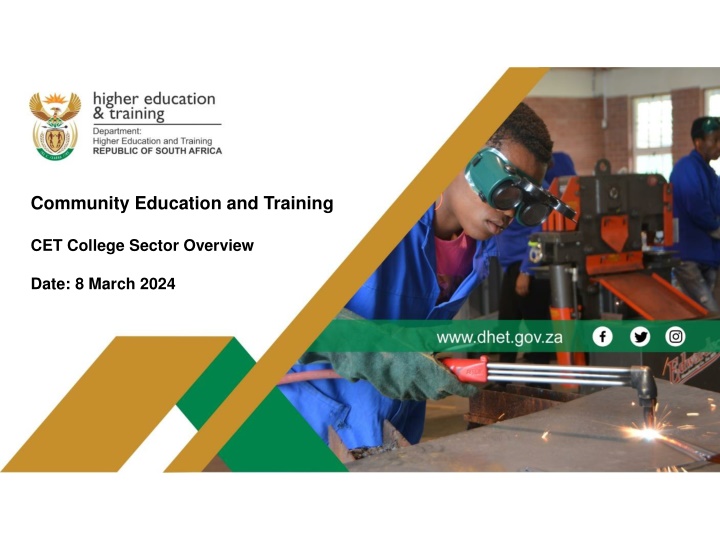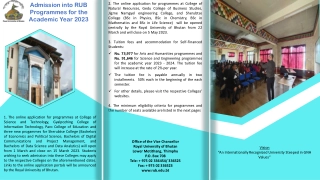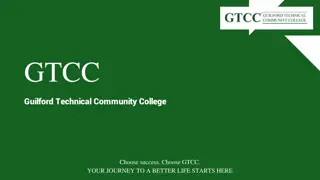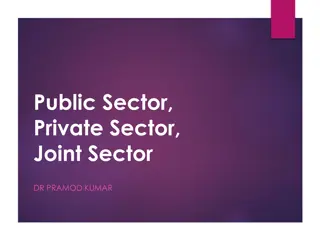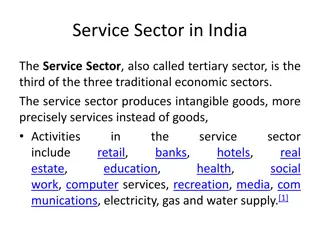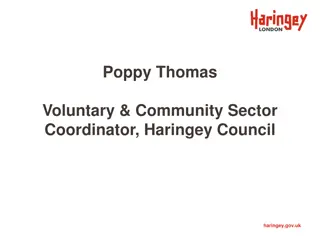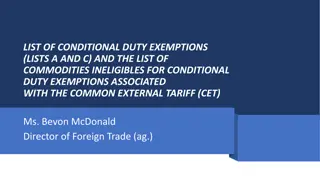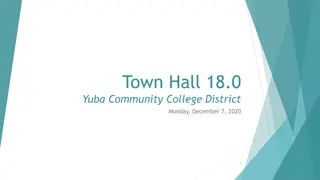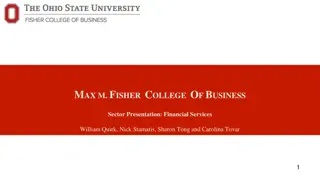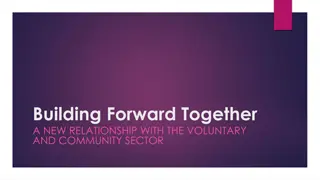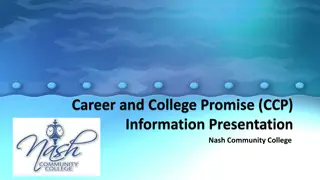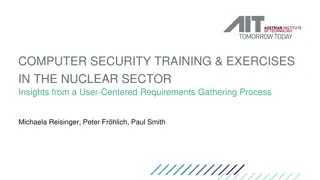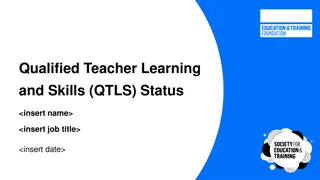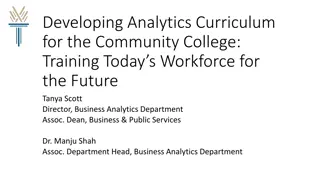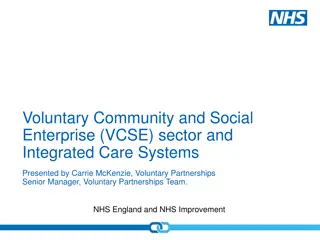Community Education and Training (CET) College Sector Overview
The Community Education and Training (CET) College Sector Overview provides insights into the background, vision, legislative framework, and policy guidelines of CET colleges in South Africa. Established to offer education and training opportunities to out-of-school youth and adults, CET colleges aim to enhance lifelong learning, skill development, and sustainable livelihoods. The overview covers key aspects such as institutional landscape, student enrollment, programs, funding, and partnerships, highlighting the vision of creating diverse and accessible pathways for individual and community advancement.
Download Presentation

Please find below an Image/Link to download the presentation.
The content on the website is provided AS IS for your information and personal use only. It may not be sold, licensed, or shared on other websites without obtaining consent from the author.If you encounter any issues during the download, it is possible that the publisher has removed the file from their server.
You are allowed to download the files provided on this website for personal or commercial use, subject to the condition that they are used lawfully. All files are the property of their respective owners.
The content on the website is provided AS IS for your information and personal use only. It may not be sold, licensed, or shared on other websites without obtaining consent from the author.
E N D
Presentation Transcript
Community Education and Training CET College Sector Overview Date: 8 March 2024
PRESENTATION OUTLINE Background and Vision Legislation and Policy Size and Shape Institutional landscape and Infrastructure Student enrolment, targets and performance Programmes and Qualification Mix Funding and financing Partnerships Conclusion
BACKGROUND In 2009, the Department of Education was split into the Department of Basic Education (DBE) and the Department of Higher Education and Training (DHET). The legislative functions of Adult Education and Further Education and Training Colleges were located in the DHET. In 2013, the White Paper on Post-School Education and Training, (WP- PSET) calls for the establishment of Community Education and Training (CET) Colleges In 2015, The Continuing Education and Training Act established nine (9) Community Education and Training Colleges (one per province). All former Public Adult Learning Centres were incorporated as Community Learning Centres (CLCs). The administration of CET colleges migrated from the Provincial Education Departments (PEDs) to DHET in April 2015. The examinations function only migrated from PEDs on 01 April 2022.
BACKGROUND WHITE PAPER OF POST-SCHOOL EDUCATION AND TRAINING Envisaged that the community colleges will have a headcount enrolment of one million by 2030, consistent with the National Development Plan 2030 NATIONAL POLICY ON COMMUNITY COLLEGES Provides access to and ensure the success of the out-of-school youth and adults in second-chance education, training and development opportunities Raise the base of learning for out-of-school youth and adults to enable them to progress to further learning opportunities and or skilling for sustainable livelihoods. Older Persons are therefore covered by the scope of the Policy and Legislation.
VISION OF THE CET COLLEGE SYSTEM A differentiated system that opens up diverse, flexible, accessible quality opportunities for individuals and communities, so that they can improve their quality of life, by progressively articulating into further learning, employment and/or sustainable entrepreneurship. lifelong learning
LEGISLATIVE AND POLICY FRAMEWORK Continuing Education and Training Act, 2006 National Policy on Learning and Teaching Support Materials National Policy on Curriculum Development and Implementation in CET Colleges Regulations on the conduct, administration and management of assessment for the National Senior Certificate for Adults (NASCA) National Policy on the conduct, administration and management of assessment for the GETCA National Improvement Plan for Teaching and Learning for CET Colleges Policy on Minimum Requirements for programmes leading to qualifications for educators and lecturers in Adult and Community Education and Training Regulations on the Assessment Process and Procedures for Adult Education and Training (AET) National Qualifications Framework (NQF) Time-Table Norms and Standards for CET Colleges National Policy pertaining to the conduct, administration and management of College examinations National Strategy for Partnerships in CET Colleges National Policy on Student and Community Support Services
INSTITUTIONAL LANDSCAPE Nine CET Colleges have been established, one in each Province. The nine CET Colleges are central offices for the administration, management and governance for the Community Learning Centres (CLCs). There are 200 main CLCs and 1591 satellite learning centres. Colleges Eastern Cape Free State Gauteng KwaZulu-Natal Limpopo Mpumalanga North West Northern Cape Western Cape Grand Total Community Learning Centres Satellites Centres 30 15 47 40 20 15 11 7 15 200 242 171 267 260 225 163 125 80 58 1591
INFRASTRUCTURE Collaboration with TVET Colleges: Partnerships between individual TVET and CET Colleges. The CET and TVET Branches have interacted on the need for partnership in relation to infrastructure. Development of a clear framework and mechanisms to enable Colleges to interact to achieve alignment and articulation. CET Infrastructure Programme: R1 billion has been reprioritised for CET college infrastructure programme. A draft concept document for the CET Colleges Infrastructure Programme is being developed. Use of DBE public schools The Department is engaging with PEDs to ensure stability where school facilities are being used. Community Learning Centres under the CET Colleges utilise school facilities for learning and teaching. To date, approximately 96% of CLCs use schools, with CLCs either sharing the facilities or having access to facilities on a full-time basis.
INFRASTRUCTURE The Department has drafted Protocols on the use of school facilities to formalise and regulate the use of schools by Community Learning Centres as the Department is looking at alternative facilities. Partnership with Faith-Based Organisations (FBOs) like Churches, the Catholic Institute of Education (CIE), and NGOs for utilisation of infrastructure for teaching and learning. Other interdepartmental partnerships currently exist with the Department of Health to offer community education in Hospitals like Cecilia Makiwane, Frere, Seshego, Thabamoopo Hospitals, etc A partnership with DSD for the identification of Old Age Care Institutions could be explored to bring community education to old persons. Currently, two centres are operating at Tshwaraganang Barkly West (NC) and New Old Age Centre in Ratanda (Heidelberg, GP)
PROGRAMME QUALIFICATION MIX (PQM) The National Register comprises the Programme and Qualification Mix that CET Colleges offer. All 9 CET Colleges offer the following Programme and Qualification Mix: o Basic Literacy Programmes (AET Levels 1, 2 and 3); o GETC: ABET (NQF Level 1); o Senior Certificate (amended) (NQF Level 4) offered in collaboration with the DBE; o Occupational Skills programmes (accredited part qualifications) offered in collaboration with SETAs, DSI, QCTO and the CIE (Catholic Institute of Education); and o Non-formal programmes offered in collaboration with DVV International (the German Institute for Adult Education) and local NGOs. These programmes may be useful for Older Persons.
OCCUPATIONAL SKILLS AND NON-FORMAL PROGRAMMES OCCUPATIONAL SKILLS PROGRAMMES NON-FORMAL PROGRAMMES End User Computer Welding Computer and Digital Support Assistant Seamstress Sewing, handcraft knitting, Crocheting, Pottery, gardening, poultry, beadwork, leathercraft, baking. Automotive Body Repair & Maintenance Arc Welder Entrepreneurship Business practices Heavy Duty Driver s License K53 Learners license
OCCUPATIONAL SKILLS AND NON-FORMAL PROGRAMMES OCCUPATIONAL SKILLS PROGRAMMES NON-FORMAL PROGRAMMES End User Computer Cell Phone repairer Seamstress New Venture Creations Welding Gardening Beading End User Computer Assistant Bricklayer, L1, 45 Credits Plumbing Hand, NQF L3, 49 Credits Coded Welding, NQF L4, 96 Credits New Venture Creation NQF L2, 32 Credits Gardening Non-formal programmes can be developed or sourced from the various partners. The needs of Older Persons will have to be determined in collaboration with the Department of Social Development. Workplace Preparation National Certificate Bread and Flour Confectionery Baking
PROGRAMME 6 ACTUAL BUDGET/ESTIMATES ALLOCATION: 2019/20 TO 2025/26 2019/20 2020/21 2021/22 2022/23 2023/24 2024/25 2025/26 Sub-programme 1 100 800 2 300 3 700 4 100 4 400 4 500 Management System Planning, Institutional Development and Support 1 886 700 1 825 300 1 952 700 2 333 100 2 423 400 2 532 100 2 643 400 155 900 163 500 212 100 226 800 223 300 233 400 243 700 Financial Planning and Management Education, Training and Development Assessment 10 500 10 200 13 400 14 000 16 900 18 100 19 100 2 054 200 1 999 800 2 180 500 2 577 600 2 667 700 2 788 000 2 910 700 Total 2019/20 2020/21 2021/22 2022/23 2023/24 2024/25 2025/26 Economic Classification 1 897 500 1 829 000 1 966 200 2 348 300 2 447 200 2 557 600 2 670 100 Compensation of Employees 2 500 1 300 4 200 7 700 5 300 5 600 5 900 Goods and Services 153 700 163 400 209 600 220 900 214 800 224 400 234 500 Transfers and Subsidies 100 100 300 900 400 300 200 Payment of Capital Assets 300 6 100 200 0 0 0 0 Payment for Financial Assets 2 054 200 1 999 800 2 180 500 2 577 600 2 667 700 2 788 000 2 910 700 Total -3% 9% 18% 3% 5% 4% Average Growth Rate(y-o-y) Proportion of total programme expenditure to vote expenditure 2.3% 2.1% 2.2% 2.3% 2.4% 2.3% 2.3%
PARTNERSHIPS MoUs: German Volkshochschul-Verband programmes. Intergovernmental Protocols: The Department of Basic Education (DBE) has partnered with the Department to offer Second Chance Matric Programme (SCMP) resources to students. The Department has partnered with Provincial Education Departments (PEDs) for hosting of Community Learning Centres (CLCs). Department of Correctional Services (DCS) for the provision of GETC: ABET qualification to offenders in correctional facilities. The Department of Small Business Development (DSBD) through its entity Small Enterprise Development Agency (SEDA) has entered in an MoU with the Department for the provision of entrepreneurship programmes. The Department of Science and Innovation (DSI) for the provision of Living Labs in CLCs in EC, KZN, NC and NW. Association also known as the Deutscher (DVV)-provision of Adult Education e.V. non-formal education
PARTNERSHIPS The NEMISA, an entity of the Department of Communications and Digital Technologies for the training of lecturers for public colleges on digital literacy and specialised digital skills. The target is for 2500 lecturers to be trained. Currently, there is an intensification of inclusive support to enable access for disabled and vulnerable groups. This is made possible by partnerships with the South African Mobility for the Blind (SAMBT), DeafSA and the South African Library for the Blind. Higher Health is supporting Colleges on a range of health and wellness, and psycho- social interventions through a range of programmes Civic Education, Establishment of comfort zones in selected community learning centres, Training of SRCs on extramural curriculum, Development of the GBV policies, implementation guidelines, monitoring tool and mediation of the policy and Expand training on basic counselling for centre managers.
PARTNERSHIPS Ecolabs which isa social enterprise that aims to optimise the Information and Communication Technology (ICT) infrastructurein townships and rural schools. Ecolabs uses obsolete, redundant or unserviceable computer equipment to build computer labs (known as Ecolabs) in schools and libraries. To date 13 Ecolabs have been established in the Gauteng College. Publishers Association of South Africa (PASA). This partnership assists in the development of Learning and Teaching Support Materials (LTSM) including the National LTSM catalogue. This includes the procurement of LTSM. The NSF has funded CET with R200 million for capacity building in the provision of new skills programmes. Currently, administrative due diligence and contracting is being conducted.
PARTNERSHIPS MICT SETA-accreditation and provision of ICT skills programmes W&R SETA-establishment of 54 ICT Labs in 9 CET College ETDP SETA-Lecturer development and Support Several SETAs have partnership with individual CET colleges
PARTNERSHIPS Partnerships with Institutions of Higher Education: University of Fort Hare -capacity building for lecturers and college management. This will also assist in the strengthening of Growth priorities for EC, which include the Agricultural sector. The Tshwane University of Technology (TUT) in the provision of Basic Engineering skills. This includes the provision of skills in the renewable energy space i.e. Solar Maintenance & Installation. The University of Johannesburg for the provision of Digital skills training. Partnerships with Faith-based Organisations The Catholic Institute of Education (CIE) for the provision of skills to students. Currently, 4 Community Learning Centres (CLCs) are located in Catholic facilities Other partnerships are being pursued with ZCC , SACC, Muslim Judicial Council as part of the faith-based community.
CRITICAL AREAS FOR COLLABORATION Infrastructure access, maintenance and development access to Social Development facilities for programme provision. Lecturer provision in Older Person residence facilities, subject to a mapping to our Community Learning Centres. Consider establishment of learning sites as SLCs in residences. Council College approval. Conclusion of a Protocol and implementation Plan with Department of Social Development enabler for collaboration. Work out the costing implications beyond lecturer provision, if any.
